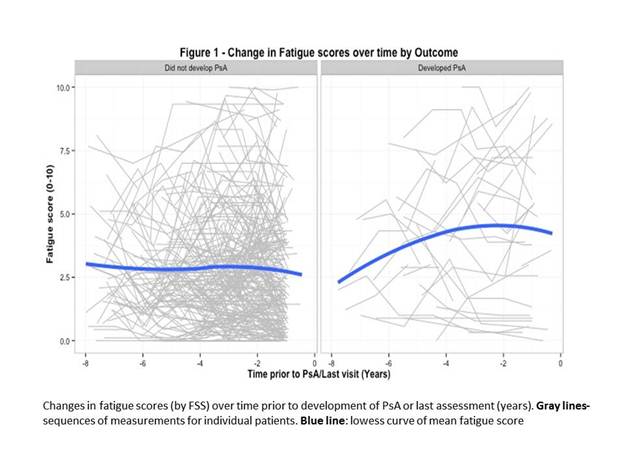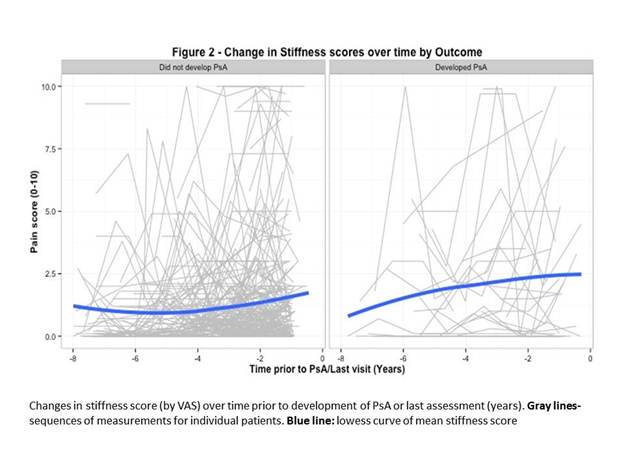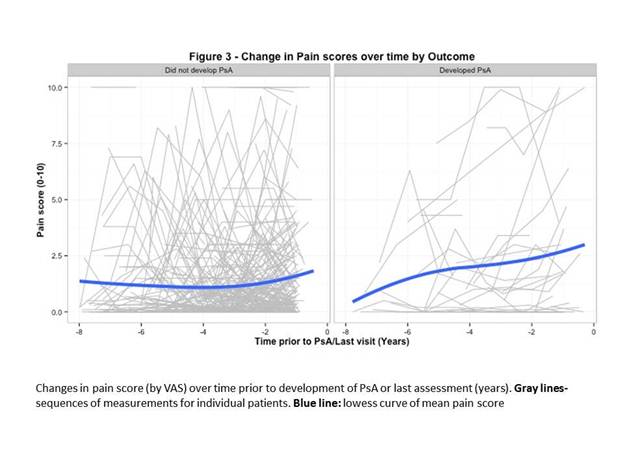Session Information
Date: Sunday, November 8, 2015
Session Type: ACR Poster Session A
Session Time: 9:00AM-11:00AM
Background/Purpose: Limited
information exists about the characteristics of pre-clinical phases of
psoriatic arthritis (PsA). We aimed to assess whether
the presence and trends in non-specific musculoskeletal symptoms predict the
development of PsA in a prospective cohort of patients
with psoriasis.
Methods:
This prospective cohort study involved patients with psoriasis who were
assessed at baseline by a rheumatologist to exclude the presence of clinical
inflammatory arthritis. The study participants were assessed annually according
to a standard protocol. The presence of musculoskeletal symptoms and patients’
scores of pain (visual analogue scale (VAS) 0-10), fatigue (Fatigue Severity
Scale), stiffness (VAS 0-10) and physical functioning (SF-36 physical component
score) were recorded at each visit. These variables served as predictors for
the development of PsA. Patients who developed inflammatory arthritis or
spondylitis were classified as PsA if they fulfilled
the CASPAR criteria. Cox proportional hazard models, involving fixed and
time-dependent explanatory variables were fitted to obtain estimates of
relative risk (RR) for the onset of PsA in
multivariate models controlling for age, sex, body mass index, nail pitting and
psoriasis area and severity index (PASI).
Results:
The results of 410 patients with psoriasis who were followed for an average
duration of 45.1±25.3 months were analyzed. A total
of 57 patients developed PsA since enrollment (mean
duration to diagnosis of PsA 46±27.8 months). At baseline, the presence of arthralgia in women (RR
2.6, 95% Confidence Interval (CI) 1.2, 5.9), heel pain (RR 4.2, 95% CI 1.3,
13.8), fatigue score (RR 1.2, 95% CI 1.04, 1.3) and stiffness score (RR 1.2,
95% CI 1.1, 1.3) predicted subsequent development of PsA.
In addition, an increase from baseline in fatigue score (RR 1.3, 95% CI 1.1,
1.5), pain score (RR 1.3, 95% CI 1.1, 1.6) and stiffness score (RR 1.2, 95% CI
1.0, 1.4) and a worsening in physical function score (RR 0.96, 95% CI 0.92,
0.99) predicted the development of PsA. The changes
in fatigue and stiffness scores over time are shown in Figures 1-3.
Conclusion:
A preclinical phase exists in patients with PsA prior
to the diagnosis of the disease. This phase is characterized by non-specific
musculoskeletal symptoms including joint pain, fatigue and stiffness.
To cite this abstract in AMA style:
Eder L, Polachek A, Rosen C, Chandran V, Cook RJ, Gladman DD. Evaluation of the Predictive Value of Non-Specific Musculoskeletal Symptoms in Preclinical Phases of Psoriatic Arthritis [abstract]. Arthritis Rheumatol. 2015; 67 (suppl 10). https://acrabstracts.org/abstract/evaluation-of-the-predictive-value-of-non-specific-musculoskeletal-symptoms-in-preclinical-phases-of-psoriatic-arthritis/. Accessed .« Back to 2015 ACR/ARHP Annual Meeting
ACR Meeting Abstracts - https://acrabstracts.org/abstract/evaluation-of-the-predictive-value-of-non-specific-musculoskeletal-symptoms-in-preclinical-phases-of-psoriatic-arthritis/



